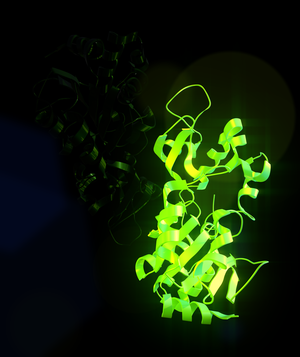SIRT1
SIRT1 is one of the seven mammalian sirtuins, a family of proteins critical to cellular regulation and longevity. Sirtuins, in general, are known for their role in extending lifespan and improving health. SIRT1 is particularly noteworthy due to its extensive involvement in cellular processes that are directly linked to the aging process, including cellular metabolism, inflammation, stress resistance, and survival.
Research has demonstrated that overexpression of SIRT1 in mice models leads to extended lifespan and delayed onset of age-related diseases, including neurodegenerative conditions, cardiovascular diseases, and metabolic disorders. Caloric restriction, a well-known lifespan-extending intervention, has been shown to activate SIRT1, suggesting a potential mechanism by which reduced calorie intake promotes longevity. Recent studies have also indicated a potential link between SIRT1 and improved vascular function, particularly through Nitrate-Mediated Vasodilation (NMD), a process vital for cardiovascular health and longevity.
Function and Mechanism
SIRT1 regulates cellular processes by deacetylating a variety of protein substrates, including transcription factors and cofactors. Through its deacetylation activity, SIRT1 impacts cellular energy metabolism, stress response, and inflammation, which collectively contribute to lifespan extension.
Cellular Metabolism
SIRT1 plays a vital role in energy metabolism by regulating the activity of peroxisome proliferator-activated receptor gamma coactivator 1-alpha (PGC-1α), a central inducer of mitochondrial biogenesis and function. Enhanced mitochondrial function aids in maintaining cellular energy balance, preventing cellular senescence, and promoting longevity.
Stress Resistance
SIRT1 is pivotal in enhancing cellular resistance to oxidative and genotoxic stress. It accomplishes this by activating forkhead box O (FOXO) transcription factors, which in turn promote the expression of genes involved in antioxidant defense and DNA repair, bolstering cellular resilience and survival.
Inflammation Regulation
By deacetylating nuclear factor-kappa B (NF-κB), a key regulator of inflammatory responses, SIRT1 modulates inflammation within cells, reducing the likelihood of chronic inflammation, a known contributor to aging and age-related diseases.
Vascular Function
Emerging research suggests that SIRT1 may play a role in promoting vascular health through mechanisms that could include the enhancement of Nitrate-Mediated Vasodilation (NMD). NMD, essential for cardiovascular health, involves the dilation of blood vessels facilitated by dietary nitrates, which are converted to nitric oxide in the body. This process is crucial for maintaining proper blood flow and blood pressure, both of which are fundamental to overall health and longevity.
Activation of SIRT1
The activation of SIRT1 has been a focal point of research due to its potential to extend lifespan and alleviate age-related diseases. Several endogenous and exogenous factors and compounds have been identified to enhance the activity of SIRT1, impacting aging and metabolic health.
SIRT1 Activating Compounds (STACs)
Resveratrol is one of the most well-known and studied SIRT1 Activating Compounds (STACs). It is a natural polyphenolic compound found in grapes, berries, peanuts, and red wine. Resveratrol mimics the effects of caloric restriction by modulating the same pathways and has shown to confer protective effects against various diseases, including cardiovascular and neurodegenerative diseases.
In addition to resveratrol, several other synthetic and natural STACs have been identified, such as SRT1720, SRT2104, and quercetin. These compounds have demonstrated the potential to enhance SIRT1 activity, modulate metabolic processes, and extend lifespan in various animal models. The translational potential of these compounds, including resveratrol, to human health and longevity remains to be fully elucidated, with ongoing studies aimed at understanding their efficacy, optimal dosages, and mechanisms of action.
NAD+ Precursors
SIRT1 activity is closely linked to the cellular levels of NAD+, a critical coenzyme involved in cellular metabolism and energy production. Increasing NAD+ levels through supplementation with its precursors, such as nicotinamide riboside (NR) and nicotinamide mononucleotide (NMN), has been shown to activate SIRT1, potentially mitigating age-related decline in cellular function and metabolism.
Caloric Restriction
Caloric restriction, without malnutrition, is known to be one of the most effective interventions to activate SIRT1, and thereby promote longevity and healthspan. This restriction in calorie intake induces an energy-deprived state, leading to the activation of AMP-activated protein kinase (AMPK), which subsequently activates SIRT1, fostering improved cellular metabolism, stress resistance, and reduced inflammation.
Exercise
Regular physical activity has been implicated in the activation of SIRT1. Exercise-induced physiological stress boosts NAD+ levels, subsequently enhancing SIRT1 activity. This increased activity plays a role in the exercise-mediated improvements in mitochondrial function, insulin sensitivity, and anti-inflammatory responses.
Fasting and Intermittent Fasting
Fasting and intermittent fasting, like caloric restriction, create an energy-deprived state that leads to the activation of SIRT1. These dietary strategies have been shown to enhance SIRT1 activity, contributing to improvements in cellular health, metabolism, and longevity.

